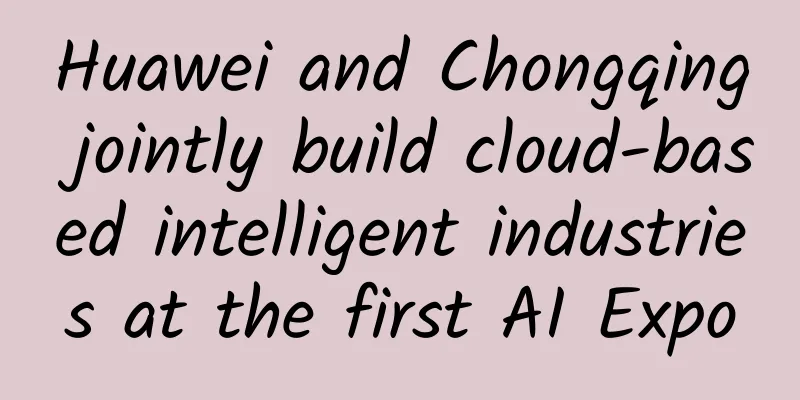Huawei and Chongqing jointly build cloud-based intelligent industries at the first AI Expo

|
[51CTO.com original article] On the afternoon of August 25, the first China International Intelligent Industry Expo with the theme of "Intelligence: Empowering the Economy and Enhancing Life" came to a close at Chongqing Yuelai International Convention Center. Huawei, as the world's leading provider of ICT infrastructure and intelligent terminals, was also invited to participate in this high-standard and high-level international professional exhibition. Huawei Cloud China Tour Chongqing Station was also chosen to be held during the Smart Expo. Taking advantage of the first "Smart Expo", we discussed the future development of Chongqing's intelligent industry with local industries and corporate users in Chongqing.
Chongqing formulates intelligent development strategy At the HUAWEI CLOUD China Tour Chongqing Station, Li Dianxun, Vice Mayor of Chongqing Municipal People's Government, first delivered an opening speech. He said that the Internet, big data, and intelligence have become the three main lines of the new round of revolution and industrial transformation in the world today. Against this background, Chongqing has formulated and implemented an innovation-driven development strategy with big data and intelligence as the core. In the next 3-5 years, Chongqing will vigorously promote the research and development of technologies with artificial intelligence as the core, promote and support the rapid development of the intelligent industry, and strive to make Chongqing a manufacturing base with a leading position in China and global influence, and reconstruct the application ecology of smart cities. "At this historical juncture of China's transformation and change, Chongqing, as a municipality and an important industrial center in China, still has many areas to explore. And as a global innovation leader, Huawei's development philosophy and operating model are indeed worthy of reference and reference for our companies." Li Dianxun believes that during this Smart Expo, Huawei Cloud entered Chongqing and built a platform for cooperation and exchange among enterprises. He hopes that in the future, based on the needs of China's transformation and change, based on Huawei's own strategic needs, and based on Chongqing's industrial foundation and future development space, the two sides will be able to achieve a larger scope and deeper level of cooperation in the field of innovation. Huawei and Chongqing work together on the road to intelligence Zheng Yelai, Vice President of Huawei and President of Huawei Cloud BU, thanked Mayor Li Dianxun for his recognition of Huawei. "We will continue to increase our investment in cloud computing and innovation strategies in Chongqing. Huawei will work hand in hand with Chongqing on the road to intelligence." He introduced that in Chongqing, Huawei actively participated in the construction of Chongqing International Internet of Things Cloud Platform, and helped Chongqing strengthen the analysis of the city's Internet platform through Huawei's Internet of Things system design, platform construction, and project management. Focusing on the needs of smart manufacturing public services, social governance, and the Internet of Things, as well as the development of Chongqing's municipal Internet of Things platform, Huawei actively promoted Huawei's partners to land in Chongqing and helped the development of Chongqing's Internet of Things companies. Zheng Yelai also said that Huawei started out as a communications company and has a keen sense of the ICT market over the years. Now that cloud computing has become a widely accepted business model, Huawei has also chosen a service model that it is better at, integrating from chips upwards. Since last year, Huawei has proposed the slogan of becoming a black soil in the field of cloud computing, so that partners can achieve better growth based on the black soil of Huawei Cloud. "Huawei's slogan is that we have technology, a future, and we are trustworthy." Zheng Yelai explained that Huawei's research and development and accumulation in technology need no further explanation. The future does not refer to Huawei's own future, but to the common future of Huawei, its partners, and its customers. The traditional industry is a standardized society, and trustworthiness is very important for partners. It is understood that Huawei is not only deploying cloud platforms in Chongqing, but also deploying intelligent manufacturing cloud platforms, leading and cultivating global intelligent manufacturing system integration. Huawei hopes to help Chongqing's intelligent development and promote Chongqing enterprises' cloud plans. He revealed that Huawei will also jointly build an intelligent networked vehicle center with partners, participate in the construction of intelligent networked platforms and key research and development platforms for new energy vehicles, and strengthen cooperation with local automobile companies in Chongqing in the fields of on-board motors, body electronics, and electronic controls. "Huawei has no plans to build cars, but hopes to use Huawei's accumulation in the fields of on-board electronics and cloud to help companies build good cars." Zheng Yelai emphasized. Be a cloud with faith and accelerate on the road of innovation During the on-site keynote speech session, Hu Weiqi, Director of Huawei EBG China Industry Cloud Development Department, gave a keynote speech entitled "Build a cloud with faith and accelerate on the road of innovation". He not only allowed hundreds of entrepreneurs on the scene to understand the innovation story of Huawei Cloud, but also shared the future development and layout of Huawei Cloud in Chongqing, which attracted strong attention from the guests. Hu Weiqi believes that what enterprises need is not only artificial intelligence technology, but more importantly, how to combine artificial intelligence technology with enterprise scenarios to help enterprises improve efficiency and reduce costs. Only such artificial intelligence technology and scenarios are meaningful. In 2012, Huawei invested a special team in the laboratory to conduct research on artificial intelligence, including research on algorithms and application scenarios. At present, Huawei can already provide AI development frameworks including warehouse services. In the future, it hopes to integrate this model into the development process of application software to help every software engineer master AI, lower the threshold for AI practitioners, and bring AI capabilities to all industries. "Huawei's vision for AI is to make AI accessible to all, to create an AI platform that everyone can afford, use well, and use with confidence, and that can truly serve all walks of life." She also introduced three major AI application scenarios. Huawei Cloud has found through practice that these three scenarios can greatly help customers reduce costs. First, in the field of transportation, Huawei has carried out artificial intelligence transformation at nine intersections in Longgang District, Shenzhen, combining AI to build the city's neural network to make travel better. Through artificial intelligence algorithms, real-time online decision-making at traffic intersections is achieved, including signal configuration requirements and intelligent division of time periods. The average travel time has been reduced by 15%, the average vehicle speed has been increased by 15%, and the congestion rate has been greatly reduced. Secondly, in the field of industrial manufacturing, Huawei deploys sensors to transmit and process data on production, materials, and storage, which can realize many intelligent applications, such as prompts on equipment operating status, energy saving and efficiency improvement, etc. Since Huawei has the entire chip capability, communication capability, and cloud capability, Huawei can collect a lot of industrial manufacturing data through chips, transmit it, and process it in the cloud. The most important industry is the video industry. Huawei can provide content review and video content labeling services based on AI technology. Huawei currently supports labeling of 23,000 types of videos, and can monitor the content of the videos after labeling. On China Gallery, Huawei can also protect intellectual property rights through AI image processing capabilities. Hu Weiqi also released Huawei's latest OBS3.0 super-intelligent storage service at the event. According to her, OBS3.0 super-intelligent storage has a stable ultra-low latency of less than 10ms, a single-stream ultra-high bandwidth of 2.4Gbps, an ultra-high throughput of 100Tbps, and tens of millions of concurrent objects. Taking the video industry as an example, in the entire video monitoring process and video content review, because Huawei can tag the stored content, users can directly analyze and process the video analysis platform based on OBS, which will increase efficiency by 30%. By defining requirements through own policies, development efficiency can also be improved by 20%. At the scene, there was another link that attracted great attention, that is, the unveiling ceremony of Huawei Chongqing DevCloud Innovation Center. The reporter learned that in May this year, the Chongqing Municipal Government and Huawei signed a comprehensive strategic cooperation agreement, and Huawei Chongqing DevCloud Innovation Center is an important project for the implementation of the agreement. The center opens up Huawei's nearly 30 years of software development experience through cloud services, integrates the most advanced development concepts, and provides a one-stop cloud DevOps platform for small and medium-sized software companies, software outsourcing companies, mass entrepreneurship and innovation companies, Internet companies, universities and a large number of software developers, building a cloud computing and big data industry ecosystem, which will further promote the rapid development of Chongqing's cloud computing and big data industries. [51CTO original article, please indicate the original author and source as 51CTO.com when reprinting on partner sites] |
<<: 7 bond modes of Linux multi-NIC
>>: TCP is not that difficult, right? This is a must-read
Recommend
Wu Zhongjie: How to become an excellent network engineer
[51CTO.com original article] Today I want to shar...
Second wave of 5G: 30 countries launch services by 2023
New network deployments and enterprise momentum a...
From 2G to 5G, three changes in the discourse power of mobile Internet
[[256146]] Hans Vestberg, CEO of Verizon, the lar...
Ministry of Industry and Information Technology: Build 30 5G fully connected factories in 10 key industries by 2023
[[375916]] On January 12, a reporter from Cover N...
What is the difference between artificial intelligence and machine learning?
【51CTO.com Quick Translation】 Artificial intellig...
One year after 5G commercialization, the terminal hardware market still has ten times more room to grow
In nine days, China's 5G commercialization wi...
SD-WAN is just the first step in WAN automation
Just like self-driving cars, IT networks are beco...
Securing the edge cloud and 5G: How to do it and why it matters
The fourth industrial revolution, known as 4IR or...
Megalayer: 618 promotion: 50% off all VPS, 20% off dedicated servers, and $10 bonus for new user registration
Megalayer is a foreign hosting company establishe...
5G and the Internet of Things: Connecting Millions of Devices
As the number of connected devices continues to g...
ExtraVM: Los Angeles 10Gbps bandwidth AMD Ryzen series high-defense VPS starting at $3.5 per month
It has been nearly three years since the last tim...
Kunpeng spreads its wings and Zhejiang has great potential | Kunpeng Application Innovation Competition 2020 (Zhejiang Division) briefing session is recruiting heroes!
At 14:30 on July 31, 2020, the Kunpeng Applicatio...
SA: Global 5G users exceed 1 billion, and 5G networks will cover 36% of the world's population
Strategy Analytics released a report today saying...
The winner of Huawei Ecosystem Partner Elite Competition is finally revealed, and the cloud ecosystem embarks on a new journey
[51CTO.com original article] On October 28, after...
Hard-core dry goods: HTTP timeout, repeated requests must see the pitfalls and solutions
[[351757]] 1 Timeout, unavoidable pain HTTP call ...









